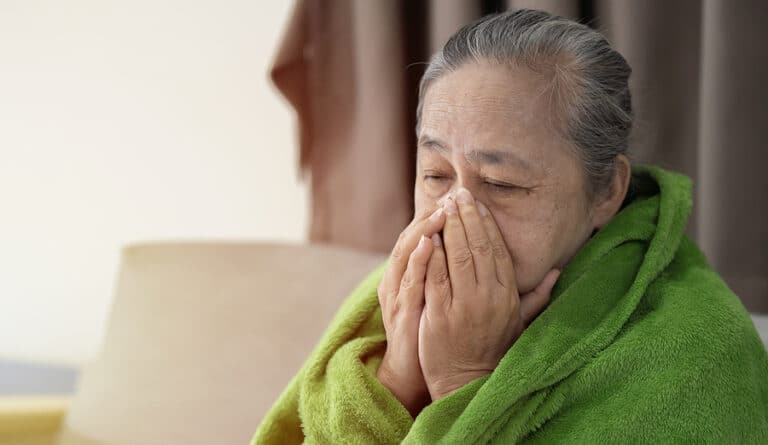
What Is Pneumonia?
Pneumonia is a type of lung disease caused by viruses, bacteria, or fungi. People of all ages are susceptible to pneumonia, but seniors are especially vulnerable due to weakening immune systems and other underlying health issues. Seniors with pneumonia may often wheeze or struggle to breathe. This is due to inflammation, which results in the air sacs in the lungs filling with fluid. When the air sacs fill with fluid, it makes it harder for oxygen to enter the bloodstream and causes breathing problems.
Symptoms of Pneumonia
The symptoms of pneumonia might easily be confused with other illnesses. Proper monitoring and consistent medical care will help loved ones ensure that seniors receive a proper diagnosis and all the help they need. Common symptoms of pneumonia are listed below.
- Fevers and chills
- A cough that produces thick mucus
- A new cough, or one that persists
- Issues with breathing – this could be difficulty breathing or rapid breathing
- Chest pain
- Headache
- Muscle weakness
- Increased fatigue that is not due to another health issue or medication
Preventing Pneumonia: Tips and Tricks
Preventive interventions such as influenza and pneumococcal bacteria immunizations, maintaining a clean home, and avoiding close contact with people who aren’t feeling well can help minimize the incidence of pneumonia in seniors. Early detection and treatment are critical in the management of pneumonia and the prevention of complications.
Senior home care support can be crucial for seniors who are dealing with health issues. Having elder care in the home can assist seniors by ensuring their home is cleaned regularly. Some aids may also assist with running errands, so seniors minimize the amount of time they’re out of the home when illnesses like pneumonia and the flu are heightened.
Home health professionals can also work with seniors to ensure their diets are high in nutritious foods that promote health and well-being, as well as help them remain active during the day. Both eating well and physical activity helps seniors stay healthy.
Seniors should also focus on getting a good night’s sleep. During sleep, the body works to heal and recover from the day’s stressors. Ensuring proper sleep can go a long way to keeping seniors both physically and mentally healthy. Loved ones should talk with seniors to evaluate their sleep routines. Creating a supportive sleep environment might mean assessing seniors’ mattress quality, regulating their foods in the evening, or even looking at medication to ensure it is not affecting their sleep.
Treatment for Pneumonia
It’s important to catch pneumonia early, which is why having senior home care supporting loved ones is critical. Doctors will run tests for pneumonia if there is a concern and prescribe medication to help them heal. In most instances, seniors will need to take over-the-counter medications and an antibiotic to help heal from pneumonia.
Loved ones and senior home health providers can work together to make sure seniors receive any treatment they need and are supported through their recovery. Fully healing from pneumonia may take weeks, but seniors can make a full recovery with the proper care.
If you or an aging loved one are considering hiring senior home care in Mauldin, SC, contact Heart of the Carolinas Home Care at 864-991-3116. Providing Home Care Services in Greenville, Simpsonville, Greer, Anderson, Spartanburg, Mauldin, Seneca, Laurens, Charleston, Columbia and the surrounding area.
- Is it Possible to Prevent Family Caregiver Burnout? - April 25, 2025
- Home Care Assistance Helps Seniors After A Fall - April 9, 2025
- How Home Care Supports Seniors Who Are Hard of Hearing - March 28, 2025

